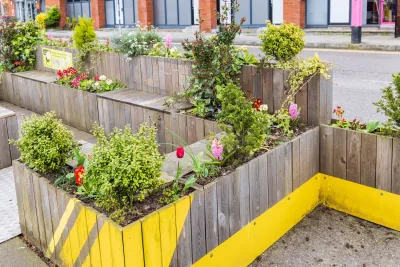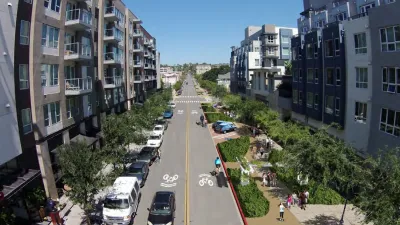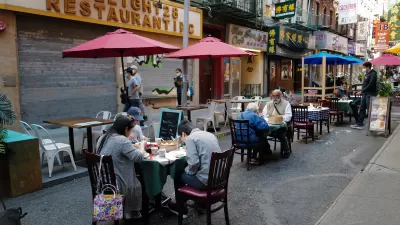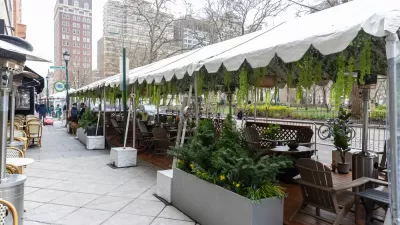Parklets got a boost during the Covid-19 pandemic, when the concept was translated to outdoor dining programs that offered restaurants a lifeline during the shutdown.

The International Parklet Symposium was held last week in San Francisco, and Streetsblog San Francisco’s Roger Rudick highlights the main takeaways.
“The conference speakers talked about how parklets were dreamed up as a way to return a portion of our streets to something more akin to their original use,” Rudick notes, providing a brief history of how street space in the United States was ceded to motor vehicles. Although streets were originally used as shared public spaces for vendors, pedestrians, and children at play, “with the help of auto industry lobbying, the concept of ‘jaywalking’ was created and it became essentially illegal to use the street for anything except driving.”
In 2005, Park(ing) Day launched in San Francisco, calling for a return to a different way of prioritizing public right-of-way and curbside space. “Now, of course, the idea of shared spaces and parklets has spread so far and wide even Tokyo (which doesn't really have street parking) has parklets, explained the speakers.” During the Covid-19 pandemic, the parklet concept was adapted to restaurants who could no longer serve patrons indoors, leading to a proliferation of outdoor dining patios in former parking spots.
FULL STORY: Conference: Parklets Key to Rolling Back Motordom’s Takeover of the Streets

Alabama: Trump Terminates Settlements for Black Communities Harmed By Raw Sewage
Trump deemed the landmark civil rights agreement “illegal DEI and environmental justice policy.”

Planetizen Federal Action Tracker
A weekly monitor of how Trump’s orders and actions are impacting planners and planning in America.

The 120 Year Old Tiny Home Villages That Sheltered San Francisco’s Earthquake Refugees
More than a century ago, San Francisco mobilized to house thousands of residents displaced by the 1906 earthquake. Could their strategy offer a model for the present?

Indy Neighborhood Group Builds Temporary Multi-Use Path
Community members, aided in part by funding from the city, repurposed a vehicle lane to create a protected bike and pedestrian path for the summer season.

Congestion Pricing Drops Holland Tunnel Delays by 65 Percent
New York City’s contentious tolling program has yielded improved traffic and roughly $100 million in revenue for the MTA.

In Both Crashes and Crime, Public Transportation is Far Safer than Driving
Contrary to popular assumptions, public transportation has far lower crash and crime rates than automobile travel. For safer communities, improve and encourage transit travel.
Urban Design for Planners 1: Software Tools
This six-course series explores essential urban design concepts using open source software and equips planners with the tools they need to participate fully in the urban design process.
Planning for Universal Design
Learn the tools for implementing Universal Design in planning regulations.
Clanton & Associates, Inc.
Jessamine County Fiscal Court
Institute for Housing and Urban Development Studies (IHS)
City of Grandview
Harvard GSD Executive Education
Toledo-Lucas County Plan Commissions
Salt Lake City
NYU Wagner Graduate School of Public Service





























